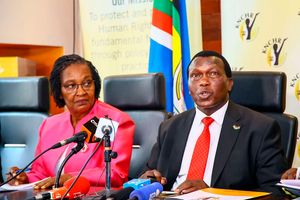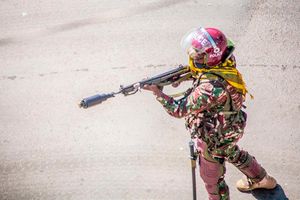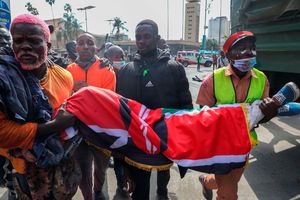
Independent Policing Oversight Authority (Ipoa) Chairperson Ahmed Issack Hassan speaks during the launch of the Missing Voices 2024 Report at the International Commission of Jurists offices in Nairobi on May 7, 2025. The report highlights cases of extrajudicial killings and enforced disappearances in Kenya.
The police oversight agency is pushing for special courts to try officers accused of human rights violations in the country.
This came as MPs mull expanding the mandate of the Independent Policing Oversight Authority (Ipoa) to include the Kenya Forest Service (KFS) and the Kenya Wildlife Service (KWS), whose rangers have also been accused of human rights abuses.
Ipoa chairperson Issack Hassan, who appeared before the Administration and Internal Affairs Committee of the National Assembly to defend the authority’s budget for 2025/26 financial year, made the revelations as complaints against police officers skyrocketed.
“If death is reported in police custody, Ipoa responds. We need to consider police violation cases as a matter of public interest. To deal with this, we need a special court to deal with police violation cases just like corruption, among others, have special courts,” he said.
Mr Hassan revealed that Ipoa is in talks with Chief Justice Martha Koome on the need to have a special court in place to deal with the police excesses.
The argument in favour of the proposal is that dedicated courts would not only handle the cases faster but also offer justice.
Ipoa had been allocated Sh1.31 billion for the 2025/26 financial year as contained in the Budget Policy Statement approved by the National Assembly.
However, in the printed estimates, the amount was scaled down to Sh1.3 billion by the National Treasury on account of the cabinet directive to slash the budgets of government entities.
In the last three years – 2022/23, 2023/24 and 2024/25 – complaints arising from police excesses have increased from 9,789 to 11,003 with minimal prosecution of the officers involved.
This has seen an increase in complaints recommended for investigations from 995 to 1,229 with a backlog of complaints currently at 3,613 and includes deaths, serious injuries, abductions and enforced disappearances.
While Ipoa has the legal mandate to investigate police excesses, Mr Hassan admitted before the committee chaired by Narok West MP Gabriel Tongoyo that even as the cases of police violations soar, the law enforcers don’t cooperate with Ipoa.
The revelations by Ipoa come as the Kenya National Commission on Human Rights (KNCHR) demanded that parliament sanctions the Ministry of Interior and Inspector-General of Police Douglas Kanja over “unprecedented” human rights abuses, including killings during the Gen-Z protests last year.
Ipoa chief executive Elema Halake, who accompanied Mr Hassan before the committee, has also previously recommended to parliament to consider amending the National Police Service Act “to hold police superiors criminally responsible under command for serious offences, including human rights violations.”
A report by the rights commission to parliament painted a picture of a trigger-happy police force that breached all the rules of crowd control and subjected Kenyans protesting against the punitive tax proposals in the 2024 Finance Bill to untold suffering.
According to the commission's vice chairperson, Ms Marion Mutugi, the state-funded human rights body has recorded 60 fatalities – 59 men and one woman – since the demonstrations began on June 18, 2024.
The commission’s dossier notes that, during last year's heightened demonstrations against police excesses, 1,376 arrests were documented across the 47 counties.
“The Commission documented 601 injuries across the country, which ranged from deep fractures, bullet wounds, soft tissue injuries and inhalation of teargas,” the report says.
Ms Mutugi said that the number of fatalities could be higher given that the agency was limited in terms of capacity in investigating some of the cases reported.
Mandera East MP Abdirahman Weytan faulted the government policy to always transfer police officers accused of excesses to North Eastern Kenya under the guise of punishment.
“We always see them being transferred to North Eastern. But they come and make a lot of money. So what kind of punishment is that?” posed Mr Weytan.









